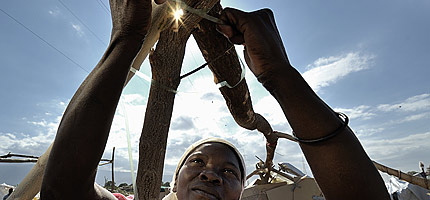© ACT Alliance/Paul Jeffrey
[En anglais & allemand]
Haïti: Un toit à l’épreuve des pluies
LWF World Service Director Impressed by Global Relief Response
One month after the devastating earthquake in Haiti, the first strong tropical rain surprised the survivors in their sheet-roofed shacks and caught them unprepared. Spontaneously a lot of people gathered in the center of the Haitian capital Port-au-Prince, demanding material for new accommodation, reported Bobby Waddell, the Haiti emergency senior adviser for the Lutheran World Federation (LWF) Department for World Service (DWS).
Erecting rain-proof housing for hundreds of thousands of homeless Haitians remains a top priority. The first showers only heralded the imminent rainy season.
In the past few weeks the DWS Haiti country program staff had supplied thousands of people with clean drinking water, food and essential supplies. The demand remained enormous. The government said the earthquake cost at least 217,000 lives and injured about 300,000 people. The UN estimates that about 1.2 million people were currently homeless or living in makeshift accommodation.
DWS Haiti was working closely with other organizations in the ACT Alliance, and had provided over 150,000 people with water, food, hygiene sets and basic supplies. Medical care, emergency shelter and latrines remain a priority.
Yet aid distribution does not always run smoothly, as pointed out by Sylvia Raulo, director of the DWS Caribbean/Haiti program. One such operation had to be discontinued when it led to skirmishes, she explained. The basic principle is first to deal with the most vulnerable, which would mean primarily pregnant women and families with small children. But Raulo also understands the people’s plight; they are traumatized and in a desperate situation, which can lead to unpredictable over-reactions.
Regaining Hope Is Essential
Another factor is that the Caribbean state was one of the poorest countries in the world even before the earthquake. Decades of domestic and foreign exploitation, poor management, corruption and the consequences of numerous natural disasters drove the country to ruin. Nevertheless, remarked Raulo, the last few weeks have proven beyond any doubt, “Haitians are an extremely resilient people.”
Raulo pointed out it was important that people regain hope. She said the challenges confronting the country and aid agencies were immense. While the fragile state institutions and problems like corruption only exacerbated the situation, in the end the solution would depend on whether “people have faith in the future” and are “able to demonstrate a will to rebuild, and perseverance to overcome the very difficult months and years to come,” she added.
Accommodation for 15,000 Families
After the initial emergency relief phase, the LWF planned to scale up its aid program in Haiti, said Rudelmar Bueno de Faria, DWS program coordinator. Preparations were underway for rehabilitation and reconstruction in close coordination with the ACT Alliance partner agencies. The next phase would include provision of education facilities, water and sanitation, temporary and permanent shelter, psychosocial care, agricultural tools and seeds. De Faria emphasized the importance of agricultural recovery, adding that farmers were being encouraged to sow right away in anticipation of a harvest this year.
DWS efforts are concentrated in cities like Leogane and Gressier, and areas outside Port-au-Prince, where 80 percent of the population had their homes destroyed, de Faria explained. Tarpaulins and tents would be distributed for emergency accommodation. He underlined the need for close cooperation with local partners “to ensure orderly and trouble-free distribution.”
According to de Faria, the LWF planned to provide shelter for 15,000 families (about 75,000 people) in four rural communes, 35 kilometers west of the capital. This was particularly urgent in view of the March/April rainy period, he said. The DWS program coordinator emphasizes the need to adhere to strict UN regulations for the new temporary accommodation: there must be 18.5 square meters per family, a corrugated iron roof, and wood, bamboo or steel frames well covered with plastic sheeting.
In the longer term, DWS Haiti would also focus on building more permanent housing. Plans for the next six to 18 months would include working with families to recycle existing materials on a “cash for work” principle. With the assistance of local masons and carpenters solid houses can be constructed on stable foundations, using “already distributed iron sheets and at least some blocks and concrete base.” The exact designs are “yet to be agreed,” de Faria explained.
Overwhelming Worldwide Assistance
DWS Director Rev. Eberhard Hitzler said he was very impressed by the worldwide offers of assistance after the Haiti earthquake. Donations and aid were not just coming from the Northern hemisphere. In the whole of Latin America, in Africa and Asia, churches and agencies had launched appeals and provided aid. Many of them had also sent relief workers to Haiti to give practical back up.
Hitzler cited the decision by staff of two DWS associate programs to donate their wages for one day to support projects in Haiti. It was an impressive sign of solidarity, he stated, that 2,000 members of the Rangpur Dinajpur Rural Service (RDRS) in Bangladesh and the entire staff of Lutheran World Service India (LWSI) unanimously supported this initiative.
Furthermore, the Evangelical Lutheran Church in Sierra Leone, which was expecting a container from the US-based Lutheran World Relief, decided to divert it to Haiti.
For Hitzler, such efforts were evidence that the LWF is a communion of churches in solidarity with the poor and needy. “Diakonia and giving are not a privilege of the rich churches,” he said.
LWF member churches see World Service as “their arm and instrument for global diakonia,” Hitzler concluded.

